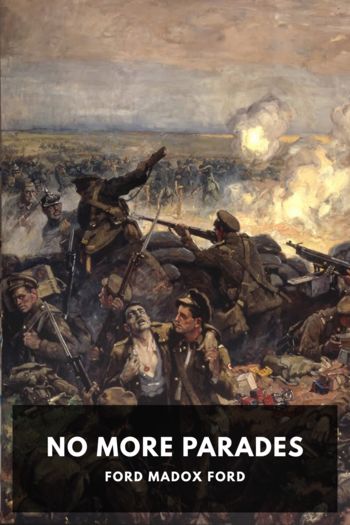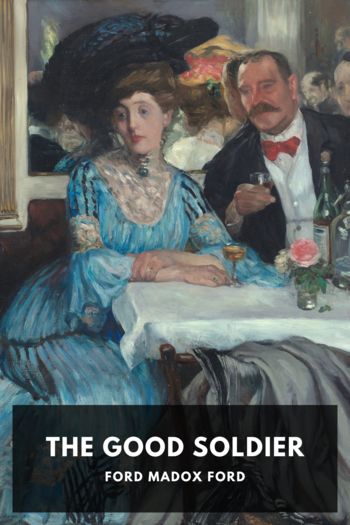Some Do Not … by Ford Madox Ford (story read aloud txt) 📕

- Author: Ford Madox Ford
Book online «Some Do Not … by Ford Madox Ford (story read aloud txt) 📕». Author Ford Madox Ford
“I shall wait until Monday night to keep him as bothered as I can to know whether he’s to start on Tuesday. He fusses like a hen over his packings and the exact hours of his movements. On Monday I shall telegraph: ‘Righto’ and nothing else.”
“And why,” the Father asked, “will ye telegraph him a vulgar word that you never use, for your language is the one thing about you that isn’t vulgar?”
Sylvia said:
“Thanks!” She curled her legs up under her on the sofa and laid her head back against the wall so that her Gothic arch of a chinbone pointed at the ceiling. She admired her own neck, which was very long and white.
“I know!” Father Consett said. “You’re a beautiful woman. Some men would say it was a lucky fellow that lived with you. I don’t ignore the fact in my cogitation. He’d imagine all sorts of delights to lurk in the shadow of your beautiful hair. And they wouldn’t.”
Sylvia brought her gaze down from the ceiling and fixed her brown eyes for a moment on the priest, speculatively.
“It’s a great handicap we suffer from,” he said.
“I don’t know why I selected that word,” Sylvia said, “it’s one word, so it costs only fifty pfennigs. I couldn’t hope really to give a jerk to his pompous self-sufficiency.”
“It’s great handicaps we priests suffer from,” the Father repeated. “However much a priest may be a man of the world—and he has to be to fight the world …”
Mrs. Satterthwaite said:
“Have a cup of tea, Father, while it’s just right. I believe Sylvia is the only person in Germany who knows how to make tea.”
“There’s always behind him the Roman collar and the silk bib, and you don’t believe in him,” Father Consett went on, “yet he knows ten—a thousand times!—more of human nature than ever you can.”
“I don’t see,” Sylvia said placably, “how you can learn in your slums anything about the nature of Eunice Vanderdecken, or Elizabeth B. or Queenie James, or any of my set.” She was on her feet pouring cream into the Father’s tea. “I’ll admit for the moment that you aren’t giving me pi-jaw.”
“I’m glad,” the priest said, “that ye remember enough of yer schooldays to use the old term.”
Sylvia wavered backwards to her sofa and sank down again.
“There you are,” she said, “you can’t really get away from preachments. Me for the pyore young girl is always at the back of it.”
“It isn’t,” the Father said. “I’m not one to cry for the moon.”
“You don’t want me to be a pure young girl,” Sylvia asked with lazy incredulity.
“I do not!” the Father said, “but I’d wish that at times ye’d remember you once were.”
“I don’t believe I ever was,” Sylvia said. “If the nuns had known, I’d have been expelled from the Holy Child.”
“You would not,” the Father said. “Do stop your boasting. The nuns have too much sense. … Anyhow, it isn’t a pure young girl I’d have you or behaving like a Protestant deaconess for the craven fear of hell. I’d have ye be a physically healthy, decently honest-with-yourself young devil of a married woman. It’s them that are the plague and the salvation of the world.”
“You admire mother?” Mrs. Tietjens asked suddenly. She added in parenthesis: “You see you can’t get away from salvation.”
“I mean keeping bread and butter in their husband’s stomachs,” the priest said. “Of course I admire your mother.”
Mrs. Satterthwaite moved a hand slightly.
“You’re at any rate in league with her against me,” Sylvia said. She asked with more interest: “Then would you have me model myself on her and do good works to escape hell fire? She wears a hair shirt in Lent.”
Mrs. Satterthwaite started from her doze on the edge of her chair. She had been trusting the Father’s wit to give her daughter’s insolence a run for its money, and she imagined that if the priest hit hard enough he might, at least, make Sylvia think a little about some of her ways.
“Hang it, no, Sylvia,” she exclaimed more suddenly. “I may not be much, but I’m a sportsman. I’m afraid of hell fire; horribly, I’ll admit. But I don’t bargain with the Almighty. I hope He’ll let me through; but I’d go on trying to pick men out of the dirt—I suppose that’s what you and Father Consett mean—if I were as certain of going to hell as I am of going to bed tonight. So that’s that!”
“ ‘And lo! Ben Adhem’s name led all the rest!’ ” Sylvia jeered softly. “All the same I bet you wouldn’t bother to reclaim men if you could not find the young, good-looking, interestingly vicious sort.”
“I wouldn’t,” Mrs. Satterthwaite said. “If they didn’t interest me, why should I?”
Sylvia looked at Father Consett.
“If you’re going to trounce me any more,” she said, “get a move on. It’s late, I’ve been travelling for thirty-six hours.”
“I will,” Father Consett said. “It’s a good maxim that if you swat flies enough some of them stick to the wall. I’m only trying to make a little mark on your common sense. Don’t you see what you’re going to?”
“What?” Sylvia said indifferently. “Hell?”
“No,” the Father said, “I’m talking of this life. Your confessor must talk to you about the next. But I’ll not tell you what you’re going to. I’ve changed my mind. I’ll tell your mother after you’re gone.”
“Tell me,” Sylvia said.
“I’ll not,” Father Consett answered. “Go to the fortune-tellers at the Earls Court exhibition; they’ll tell ye all about the fair woman you’re to beware of.”
“There’s some of them said to be rather good,” Sylvia said. “Di Wilson’s told me about one. She said she was going to have a baby. … You don’t mean that, Father? For I swear I never will. …”
“I daresay not,” the priest said. “But let’s talk about men.”
“There’s nothing you can tell me I don’t know,” Sylvia said.
“I daresay not,” the priest answered. “But let’s rehearse what you do know. Now suppose you could elope with a new man





Comments (0)